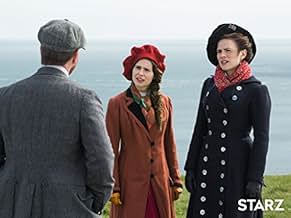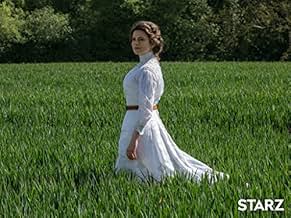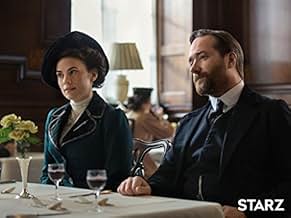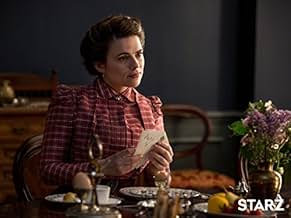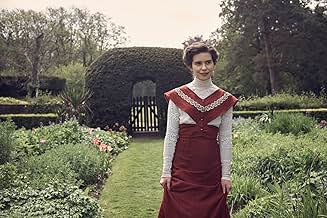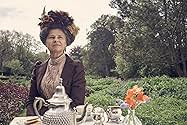As divisões sociais e de classe na Inglaterra do início do século XX através da interseção de três famílias, os ricos Wilcoxes, os gentis e idealistas Schlegels e os Basts de classe média ba... Ler tudoAs divisões sociais e de classe na Inglaterra do início do século XX através da interseção de três famílias, os ricos Wilcoxes, os gentis e idealistas Schlegels e os Basts de classe média baixa.As divisões sociais e de classe na Inglaterra do início do século XX através da interseção de três famílias, os ricos Wilcoxes, os gentis e idealistas Schlegels e os Basts de classe média baixa.
- Indicado para 1 prêmio BAFTA
- 1 vitória e 12 indicações no total
Explorar episódios
Avaliações em destaque
I fell in love with Emma Thompson's portrayal of Margaret Schlegel in the 1990s film version. I loved the film as a whole. But this version is just as worthy, and being a four-hour series, can embrace a larger picture and more importantly, a larger canvas of characters.
Leonard Bast is central to the plot, but in the film, he was a cipher, a vessel and a canvass for the sisters to paint. I read the book and while women of their class might have seen him that way, I didn't, and I liked that he was given more of a presence and personality. In the film there was no real connection between him and Helen, while in this version, there is one, however tenuous and fleeting. I felt it gave him the respect he deserved, and in doing so strengthened the underlying message.
I also preferred this version of Henry. Hopkins is brilliant, but to me, Margaret's attraction to him in the film made little sense. No, not even in Edwardian times. She was fierce and self-possessed, he was dull and rigid, and she didn't need his money or stamp of approval. I needed to buy the connection and this version made it breath so much more freely. Not even Emma Thompson can convince me of something unpalatable.
Some stories just need more time to unfold. Four hours worked well enough, whereas two and half, or even three, didn't. I still love the film version and Helena Bonham Carter is just irreplaceable, but Philippa Coulthard makes a great Helen too People who want to have an issue with Jackie Bast or a few servants or doctors being minorities can fuss away about it all they want. It might be historically unlikely, but it is by no means historically "incorrect" and it shouldn't jar anyone who is paying attention to what matters in the story. If anything it adds to it.
I loved this version. Kudos to all involved, especially Atwell, Coulthard, McFadyen, and the young actor playing Tibby. Oh, and Ullman. It can be scary to take on a classic that has supposedly been "claimed" by film deities. They did it proud.
Leonard Bast is central to the plot, but in the film, he was a cipher, a vessel and a canvass for the sisters to paint. I read the book and while women of their class might have seen him that way, I didn't, and I liked that he was given more of a presence and personality. In the film there was no real connection between him and Helen, while in this version, there is one, however tenuous and fleeting. I felt it gave him the respect he deserved, and in doing so strengthened the underlying message.
I also preferred this version of Henry. Hopkins is brilliant, but to me, Margaret's attraction to him in the film made little sense. No, not even in Edwardian times. She was fierce and self-possessed, he was dull and rigid, and she didn't need his money or stamp of approval. I needed to buy the connection and this version made it breath so much more freely. Not even Emma Thompson can convince me of something unpalatable.
Some stories just need more time to unfold. Four hours worked well enough, whereas two and half, or even three, didn't. I still love the film version and Helena Bonham Carter is just irreplaceable, but Philippa Coulthard makes a great Helen too People who want to have an issue with Jackie Bast or a few servants or doctors being minorities can fuss away about it all they want. It might be historically unlikely, but it is by no means historically "incorrect" and it shouldn't jar anyone who is paying attention to what matters in the story. If anything it adds to it.
I loved this version. Kudos to all involved, especially Atwell, Coulthard, McFadyen, and the young actor playing Tibby. Oh, and Ullman. It can be scary to take on a classic that has supposedly been "claimed" by film deities. They did it proud.
...is that they don't put their money where their mouth is and have a lead character played by a racial minority person. Inserting people of color in some of their recent productions is just too obviously done because they have to stick a minority in there somewhere or they will feel the trendy white guilt. It is an insult to anyone with a logical and realistic brain cell in their head why they do this. And although I am sure the minority actors are very happy to have the roles and the money and the exposure, you would think they would feel somewhat put out because they are being used to be tokens of political correctness not because of their talents.
I'm writing this review after episode 2, mainly to counter some of the other overly critical reviews of Howard's End.
I loved the movie version with Emma Thompson and Anthony Hopkins, but I feel this miniseries version can explore further some of the issues and topics E.M. Forster touched on in his book; class, gender, nationality etc. Also the mirrored circumstances across the class divide and how characters deal with them
As regards race and some of the casting i.e. the housemaid and Jacky Bast, I think they were interesting choices and one Forster would have approved of. He was a fierce opponent of racism (especially anti-anti-semitism) and, to answer another question a reviewer posed, yes there were black people in Edwardian London, all part of the class struggles of the period.
The cast are all excellent, especially Hayley Atwell and Philippa Coulthard. The costumes and cinematography are great. In the first episode the background music seemed rather loud and obtrusive, but this wasn't a problem for me in episode 2. I'm looking forward to episodes 3 & 4.
To those who say it's slow and nothing happens, I'm not sure what to say. Maybe watch the other channel with 'I'm a celebrity get me out of here' on it, or a Transformers movie.
I loved the movie version with Emma Thompson and Anthony Hopkins, but I feel this miniseries version can explore further some of the issues and topics E.M. Forster touched on in his book; class, gender, nationality etc. Also the mirrored circumstances across the class divide and how characters deal with them
As regards race and some of the casting i.e. the housemaid and Jacky Bast, I think they were interesting choices and one Forster would have approved of. He was a fierce opponent of racism (especially anti-anti-semitism) and, to answer another question a reviewer posed, yes there were black people in Edwardian London, all part of the class struggles of the period.
The cast are all excellent, especially Hayley Atwell and Philippa Coulthard. The costumes and cinematography are great. In the first episode the background music seemed rather loud and obtrusive, but this wasn't a problem for me in episode 2. I'm looking forward to episodes 3 & 4.
To those who say it's slow and nothing happens, I'm not sure what to say. Maybe watch the other channel with 'I'm a celebrity get me out of here' on it, or a Transformers movie.
This series is quite beautiful in terms of scenery, score and cinematography, and though the dialogue is a bit meandering and often feels to be of little consequence I did enjoy the dynamic between the three siblings and their aunt.
The main issue I have with the series is the total lack of chemistry between any of the romantic pairs. Absolutely none of their relationships felt believable.
The only characters I felt had any potentially sexual chemistry was Mrs Wilcox and Margaret, so to see Margaret later paired with the bland, unlovable and callous Mr Wilcox was baffling. The feelings which they supposedly have for each other do not read as authentic, and so Margaret becomes a less likeable character as a consequence.
Furthermore, several pieces of the story feels disjointed - I'm thinking particularly of the space between episodes 1 and 2 and the of end; both places where large amounts of time is skipped over. This kind of skipping is of course typical of epilogues, but in this case it felt weirdly jarring. They were obviously trying to wrap the series up in a neat little bow, but if felt anything but neat.
Without spoiling the end, the events which lead to the resolution seemed extremely cheap and almost offensive in how certain characters were disposed of.
If nothing else the series did make me curious to read the book Howard's End and see whether the series fails due to going too far away from the source material, or not having the proper means to give the source material life.
The main issue I have with the series is the total lack of chemistry between any of the romantic pairs. Absolutely none of their relationships felt believable.
The only characters I felt had any potentially sexual chemistry was Mrs Wilcox and Margaret, so to see Margaret later paired with the bland, unlovable and callous Mr Wilcox was baffling. The feelings which they supposedly have for each other do not read as authentic, and so Margaret becomes a less likeable character as a consequence.
Furthermore, several pieces of the story feels disjointed - I'm thinking particularly of the space between episodes 1 and 2 and the of end; both places where large amounts of time is skipped over. This kind of skipping is of course typical of epilogues, but in this case it felt weirdly jarring. They were obviously trying to wrap the series up in a neat little bow, but if felt anything but neat.
Without spoiling the end, the events which lead to the resolution seemed extremely cheap and almost offensive in how certain characters were disposed of.
If nothing else the series did make me curious to read the book Howard's End and see whether the series fails due to going too far away from the source material, or not having the proper means to give the source material life.
I really have enjoyed the series but some of the casting just is so out of place it's incredibly distracting. At first I was confused by the doctor treating an upper middle class family in Edwardian England being Asian. Then with the servant being black which would have been extremely unusual but not entirely implausible. But then with an interracial marriage that raises NO eyebrows? It stretches incredulity and pulls you directly out of the story.
Colorblind casting only works when it's not impossible in the actual story. In this case it's so improbable it's distracting. I don't understand the thought process involved in casting a classic like this. Especially where it would make massive changes to the story if the characters are not white as that was the reality of the era.
That said, the cast handled their jobs brilliantly and it was charmingly done.
Colorblind casting only works when it's not impossible in the actual story. In this case it's so improbable it's distracting. I don't understand the thought process involved in casting a classic like this. Especially where it would make massive changes to the story if the characters are not white as that was the reality of the era.
That said, the cast handled their jobs brilliantly and it was charmingly done.
Você sabia?
- CuriosidadesHayley Atwell and Matthew McFadyen worked to together in "The Pillars of the Earth" in 2010.
- ConexõesReferenced in Honest Trailers: The Oscars (2017) (2017)
Principais escolhas
Faça login para avaliar e ver a lista de recomendações personalizadas
Detalhes
- Data de lançamento
- Países de origem
- Central de atendimento oficial
- Idiomas
- Também conhecido como
- 霍華德莊園
- Locações de filme
- Myddleton Square, Clerkenwell, Londres, Inglaterra, Reino Unido(Schlegels' house)
- Empresas de produção
- Consulte mais créditos da empresa na IMDbPro
Contribua para esta página
Sugerir uma alteração ou adicionar conteúdo ausente








